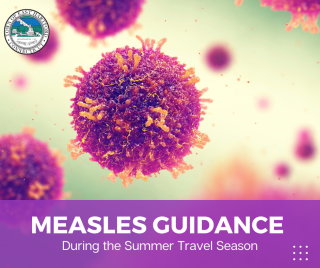Guidance on Measles during the Summer Travel Season

As of June 8, 2023, the Centers for Disease Control and Prevention (CDC) has been notified of 16 confirmed U.S. cases of measles, with 14 (88%) linked to international travel. Most of these cases were among children who had not received measles-mumps-rubella (MMR) vaccine. To prevent measles infection and spread linked to travel, the East Hartford Health Department is advising residents to make sure they are up to date on their MMR vaccinations, especially prior to international travel, regardless of the destination.
Background
Measles (rubeola) is extremely contagious; one person infected by measles can infect 9 out of 10 of their unvaccinated close contacts.
- Measles typically begins with a prodrome of fever, cough, coryza (runny nose), and conjunctivitis (pink eye), lasting 2-4 days prior to rash onset.
- Measles can cause severe health complications, including pneumonia, encephalitis (inflammation of the brain), and death.
- Infected people are contagious from 4 days before the rash starts through 4 days afterward.
- The incubation period (the time between exposure to the virus and when symptoms appear) for measles from initial exposure to fever is usually about 10 days (range 7 to 12 days), and from exposure to rash onset is usually about 14 days (range 7 to 21 days).
- Declines in measles vaccination rates globally during the COVID-19 pandemic have increased the risk of larger measles outbreaks worldwide, including in the United States.
- The virus is transmitted by direct contact with infectious droplets or by airborne spread when an infected person breathes, coughs, or sneezes.
- Measles virus can remain infectious in the air and on surfaces for up to 2 hours after an infected person leaves an area.
In the United States, measles is commonly associated with unvaccinated U.S. travelers returning from other countries where measles is actively circulating. International visitors and returning U.S. travelers can expose U.S. residents in transit and after arrival, leading to additional cases and the possibility for larger outbreaks.
Recommendations for International Travelers
- Consult with your doctor several weeks before traveling abroad, regardless of your destination, to see if you or any dependents need MMR vaccine. You should be up-to-date on all routine vaccines, such as measles-mumps-rubella (MMR), tetanus, and flu. Depending on where you’re going and what activities you plan, other vaccines may be recommended.
- Two doses of MMR vaccine provide better protection (97%) against measles than one dose (93%). Getting MMR vaccine is much safer than getting measles, mumps, or rubella.
- At least one of the following is considered evidence of measles immunity for international travelers:
- Birth before 1957
- Documented administration of two doses of live measles virus vaccine (MMR, MMRV, or other measles-containing vaccine), or
- Laboratory (serologic) proof of immunity or laboratory confirmation of disease
- You should plan to be fully vaccinated (two doses) at least 2 weeks before you depart.
- After international travel, you should watch for signs and symptoms of measles for 3 weeks after you return to the United States. If you or your child gets sick with a rash and a high fever, call your doctor. Tell them you traveled abroad and whether you or your child have received MMR vaccine.
- Before your next trip, check your destination and CDC’s Global Measles Travel Health Notice for more travel health advice, including where measles outbreaks have been reported.
For more information or to speak to a public health nurse, please contact the East Hartford Health Department at 860-291-7324.

